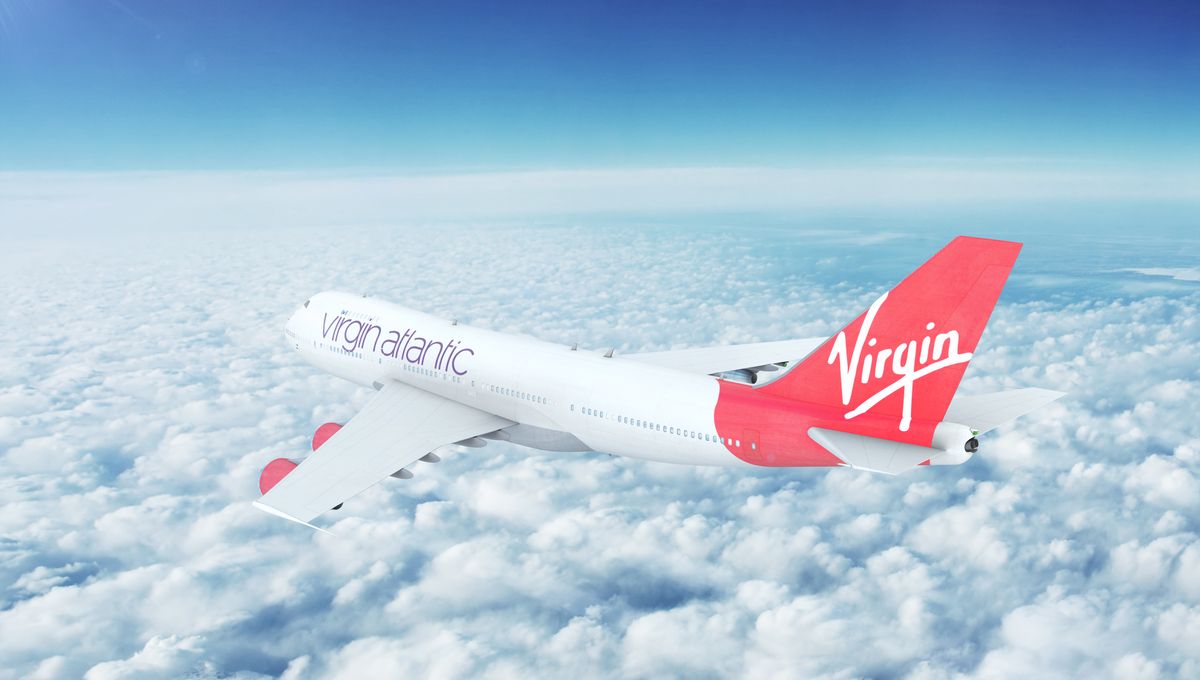
For the first time in aviation history, a passenger jet powered only by alternative “green” fuels has left the tarmac. Currently making its way from London to New York, the Boeing 787 aircraft is carrying 60 tonnes of propellant made entirely from waste fats and agricultural by-products.
Operated by Virgin Atlantic, the flight – which left London Heathrow at 11:30 am UTC this morning – has been organized to demonstrate the potential of so-called sustainable aviation fuels (SAF) as the industry looks to decarbonize. Scheduled to land at New York’s JFK airport at 2:40 pm ET, the jet is not carrying any commercial passengers or cargo, although Virgin Atlantic founder Sir Richard Branson, the airline’s chief executive Shai Weiss, and Britain’s transport minister Mark Harper are all on board.
Seen as a stepping stone towards truly sustainable flying, SAFs do still release carbon into the atmosphere when combusted, although their “lifetime emissions” are thought to be around 70 percent lower than conventional jet fuels. Many airlines already use a blend of regular fuel and SAF, although the high cost of the latter means that it currently only accounts for about 0.1 percent of aviation propellant used worldwide.
Supplied by Air BP and Virent, the SAF powering today’s Virgin Atlantic flight consists of 88 percent hydroprocessed esters and fatty acids (HEFA) and 12 percent synthetic aromatic kerosine (SAK), which is derived from the waste products of corn production. Speaking before the flight took off, UK Transport Secretary Mark Harper said in a statement that “today’s historic flight, powered by 100 percent sustainable aviation fuel, shows how we can both decarbonize transport and enable passengers to keep flying when and where they want.”
Virgin Atlantic CEO Shai Weiss added that the flight “proves that sustainable aviation fuel can be used as a safe, drop-in replacement for fossil-derived jet fuel and it’s the only viable solution for decarbonizing long-haul aviation.”
The aviation industry currently accounts for 2-3 percent of global carbon emissions, and the quest to achieve net zero flights by 2050 is seen as a crucial target in the fight against climate change. As part of the strategy to reach that goal, the UK government plans to require all airlines to use at least 10 percent SAF by 2030, although many environmental activists are critical of this approach.
For example, Magdalena Heuwieser from the advocacy group Stay Grounded told Reuters that today’s flight is merely a “greenwashing distraction.”
“[Fuel substitutes] are nowhere close to being scalable in the necessary timeframe to avoid climate collapse. What is urgently needed is to reduce the burning of fossil jet fuels, which means reducing flights wherever possible,” she said.
Echoing that statement, Dr Guy Gratton, associate professor of aviation and the environment at Cranfield University, told BBC News that “we can’t produce a majority of our fuel requirements this way because we just don’t have the feedstocks. And even if you do, these fuels are not true ‘net zeros‘.”
To truly decarbonize the aviation industry, it will be necessary to move beyond SAF and develop carbon-neutral alternatives such as e-fuels, which are made from captured carbon emissions and hydrogen. While these fuels do emit carbon when burned, the amount released is equal to the amount removed from the atmosphere during the manufacturing process, meaning their overall impact is zero.
Today’s historic flight comes at a crucial time, with world leaders set to meet on Thursday for the beginning of the COP28 climate summit in Dubai. As ever, aviation is likely to be a major talking point at the event, which seeks to secure pledges from governments around the world to reduce their emissions.
Source Link: World's First Transatlantic Flight Using 100% "Green Fuel" Takes To The Skies